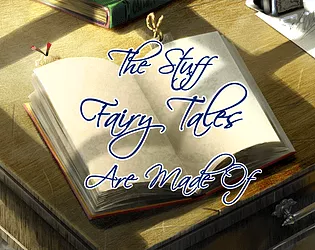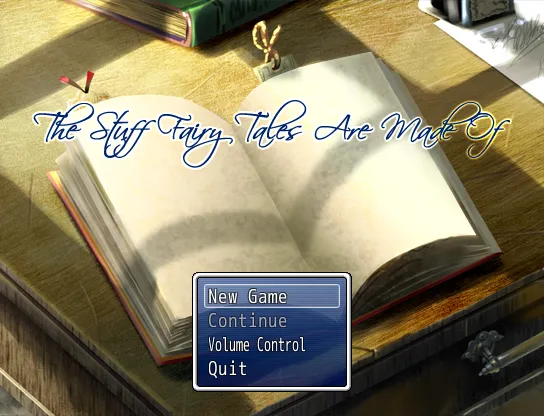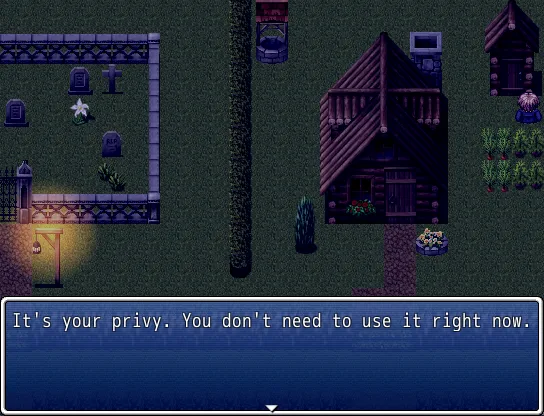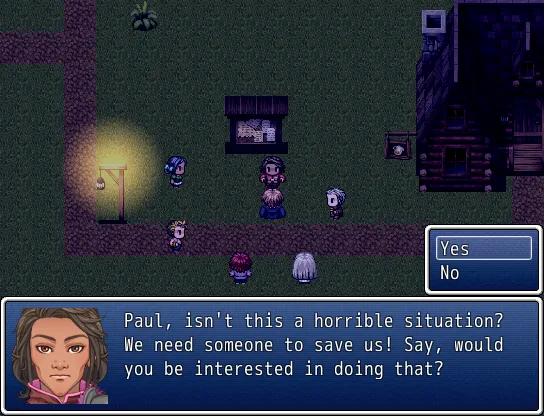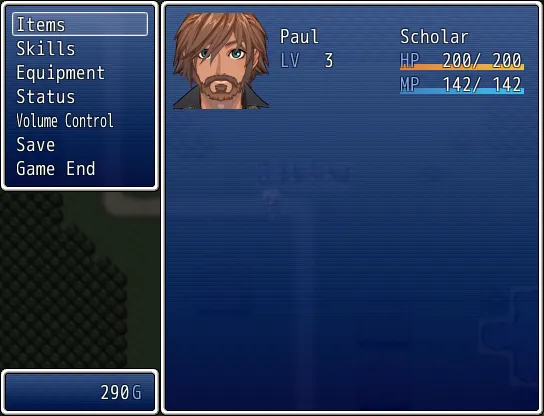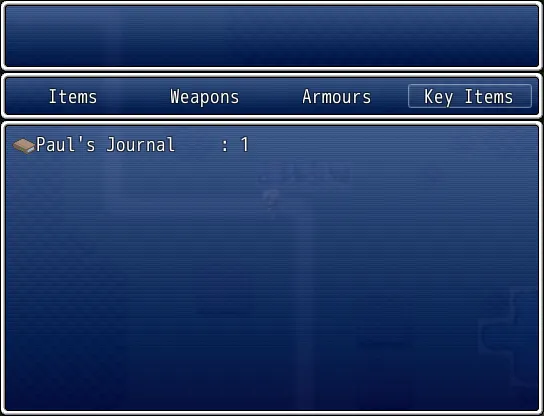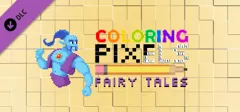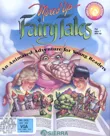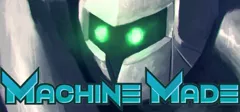The Stuff Fairy Tales Are Made Of
Description
Paul is not an adventurer, but a scholar with a thirst for knowledge, living peacefully in a village in the Southern Kingdom. However, when the kingdom is cast into perpetual night by a witch's curse, he ventures out of his comfortable life to undo the curse, by persuasion of possible, by force if necessary. Over the course of the journey, he will improve his skills, gain knowledge, explore, fight and solve simple puzzles, alone or with the aid of companions met along the way.
The Stuff Fairy Tales Are Made Of is a game created in RPG Maker VX Ace, including typical features such as fixed, linear character development and turn-based combat controlled through a menu system, but also some less common ones, such as a journal that includes information about enemies and bosses along with quests, Paul being able to learn about the weak spots of enemies and use that knowledge for increased damage, and also learning magic from scrolls instead of automatically, at certain levels, as his companions do, or the fact that certain NPCs can craft otherwise unobtainable potions for the party if brought the necessary ingredients. In addition, a section of the game plays like an adventure game.
The story is inspired by folk tales collected by Pavol Dobsinsky in 19th century Europe, although historical accuracy has not been religiously adhered to.
Groups +
Screenshots
Reviews
Players
Average score: 3.3 out of 5 (based on 1 ratings)
Pretty good for a free RPG Maker game, its less common features being the better ones.
The Good
Let's start with the positive aspects that RPG Maker brings to the games created in it, beginning with a certain level of familiarity. Yes, there are some titles that break that mold, but in the vast majority of cases there's no need to learn not just the basics, but also most common gameplay systems and features, and this style of gameplay remains in use after all this time because, for the most part, it just works, at least for this type of game. And, while The Stuff Fairy Tales Are Made Of does do some things differently, and those differences actually tend to be its strong points, the general rules still apply, so you can pretty much jump right in, with no need for a tutorial or trial and error. Still, a plain text file with some basic instructions exists in the game folder, for those who need it.
But I mentioned differences, and it may be said that those include the fact that the main character, Paul, is a scholar, not an adventurer, and that he learns magic from scrolls instead of at certain levels, automatically. And it may also be said that there's a general emphasis on learning, which is also reflected in the journal, which isn't just an otherwise fundamental feature of RPGs that, at least to my knowledge, is far less common than it should be in RPG Maker games, but which, in this case, also includes information about enemies and bosses alongside quests. And sometimes you can learn about an enemy before encountering any, or learn their weak spot, if they have one, before killing ten, which is how that information and the possibility to use the corresponding ability normally appears.
The ability to learn and target an enemy's weak spot also makes Paul more useful in combat even before learning or without using magic. But, while boss fights are different and also show that a fair bit of care and effort was put into them, when it comes to regular battles, the difficulty is rather low, the game not aiming to be challenging in that manner. That may bother some, but for me it was a positive aspect and, coupled with the low MP cost of Adele's healing and the fact that you can save anywhere, which I still say should be mandatory for games simply in order to respect the player's time, before getting into debates about difficulty, meant that I never even made use of Paul's ability to make a space safe to rest. That doesn't work everywhere, but sometimes it's an additional option for those who find themselves in a tight spot, want to recover before a tougher battle or merely want to save the time needed to get back to a designated resting spot.
Successfully escaping combat is also pretty much a certainty, but there's a section of the game where it's necessary to do so each and every time, and another where it's highly recommended. Both of these fall under differences from the typical formula and they're implemented well, the first such section, when the game plays more like an adventure game, probably deserving a special mention, both because of the manner in which the effect was implemented and because of the little discussions you can have with various NPCs during that period. And that's not the only twist in the story. Admittedly, the others shouldn't really surprise anyone, but they're welcome nevertheless.
The Bad
One less common aspect that I'm uncertain about, on the other hand, is making potions. Yes, gathering ingredients for potions that, in most cases, can't be obtained otherwise can be a nice enough change of pace for a while, and it may make the difference in boss fights, but the implementation leaves plenty to be desired. For one, there's no journal section for the potions, so you need to memorize or write down the necessary ingredients on your own. Then, contrary to what you might expect, you can't make potions yourself, but need to rely on NPCs. Worst, however, is the tedious process of gathering those ingredients, as they tend to only appear in one place and in low quantities, some require resting before reappearing, others have a rather low chance of dropping from particular enemies or fishing...
Also, while I'm at problems with the game's less common features, there seem to be some bugs when it comes to the bestiary entries for some enemies that you learn about before encountering, or encounter but escape from, without killing, since in some cases the entries appear even in those situations, for example after learning about chimeras, and in others they don't, for example after learning about skeletons or fleeing from man-eating plants. And, while I seem to have read something indicating that for some reason this is intentional, I'd also consider it a bug that if you use a scroll for a spell that Paul already knows, the message that you learned a spell still appears and the scroll is otherwise wasted. But the bigger problem when it comes to this aspect is the missed opportunity of providing the other characters with a more realistic method of learning their skills and spells, since the typical system of gaining abilities when certain levels are reached, automatically, applies to everything except Paul's magic.
And since I got to typical RPG Maker systems, I must mention the fact that you need to select combat actions at the start of the round for all party members, so you can't react to what happens during a round and can even perform actions on targets that you really wouldn't want to perform them on, since if the chosen target is no longer available, the chosen action will be performed on the first one that is available. Past that, I wonder whether the fact that status effect durations replace each other, so an effect can have its duration lowered if it's applied again before expiring, is also enforced by RPG Maker, or at least by this version of it, or there would be a way to avoid it and the developer failed to make use of it. And the same goes for the fact that the remaining duration of status effects is only displayed for enemies, not also for party members, and that only two status effects are displayed for party members, while more can be displayed for enemies. On the other hand, the fact that Mana Barrier doesn't seem to work, not preventing status ailments from affecting the party, is clearly a bug.
Otherwise, a significant part of the time spent playing this game will be spent in a castle with one hundred floors, which is not optional. Yes, the floors are small and there are a few secrets that allow skipping far ahead, but using them may mean missing out on useful items and good sources of experience, and the whole thing feels like the developer wanted to check a box somewhere and having to spend several hours grinding away in that dungeon before you can finally move on really breaks up the game. In addition, while some attention to detail can be seen, there are also moments when the developer seems to have gotten about as bored as the player is likely to get and seeing the same room models just keep being reused after a while only makes it worse, the fact that the characters point out multiple times that they're repeating not making much of a difference. And, while they do reduce the area that needs to be covered and the number of places that need to be checked if you don't want to miss any secrets or loot, I still found inaccessible rooms frustrating and kept thinking that a way in probably existed but I was failing to find it.
Past that, some of the graphical assets struck me as rather poor, some objects looking rather weird, especially in interiors, and some enemies facing forward instead of right, appearing to be intended to be used for a battle system with the other view. But I'd call that a minor issue, and the low difficulty and easy healing also makes the fact that so many enemies poison and for a pretty long time you're not able to cure poison by magic less of a problem than it'd otherwise be, though it remains annoying. Other than that, I'm not sure whether going farther north, after defeating Death, is counterintuitive in a poor or actually rather smart way. And I'm also uncertain what to think about having a priest who can revive but not heal or cure anything. And then there are some even smaller issues that I'll nevertheless mention here, such as skipping straight to the dialogue for completing the quest from Rabstein's hunter if I did so without actually receiving it first, the inn at the docks not offering an option to rest, or the word "possession" in the store interface, which actually made me think that it was some ability that I didn't know how to access before realizing that the number of items owned was displayed there.
The Bottom Line
I'm quite sure that this is the first time I play a game made in RPG Maker VX Ace, and in fact I think that I never played any made in any version other than 2000 before, which is also the one that I used when I tried to make a game, way back. I did also make an attempt in RPG Maker XP, but that was mainly limited to working on the database and trying and failing to learn the scripting, so it doesn't really count. As a result, while it's pretty obvious that some of the game's problems and limitations are the result of the engine that was used, I can't be certain in every case, and I definitely don't know how many could be eliminated, or at least mitigated to a greater extent, by scripting.
Overall, The Stuff Fairy Tales Are Made Of does some things differently, and those tend to be its better aspects, while many of its problems, with the notable exception of the sheer size and repetitiveness of that dungeon, probably have to do with the engine and, at least in my view, are mitigated to a fair extent by its rather low difficulty. That some of those less common features weren't developed even further is a missed opportunity, but I'd say that, even so, it's pretty good for a free RPG Maker game.
Windows · by Cavalary (11443) · 2022
Analytics
Identifiers +
Contribute
Are you familiar with this game? Help document and preserve this entry in video game history! If your contribution is approved, you will earn points and be credited as a contributor.
Contributors to this Entry
Game added by Cavalary.
Game added December 9th, 2022. Last modified February 12th, 2023.
